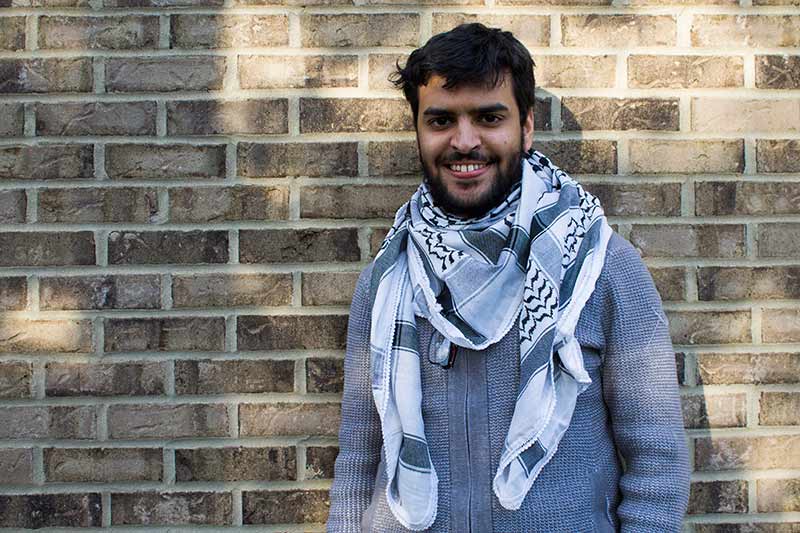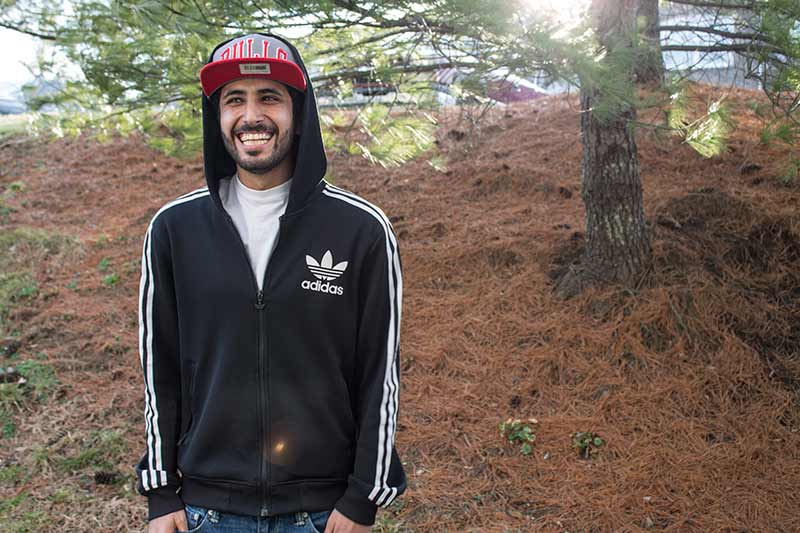Introduction
GETTING TO KNOW SAUDI STUDENTS
It’s everyone’s biggest fear at the beginning of college, showing up for the first day, not knowing anyone and getting lost on their way to class.
But imagine what it would feel like if English wasn’t your first language and many of your American classmates avoided contact with you because of your thick accent or simply the color of your skin.
For the over 500 Saudi Arabian students that have attended NKU since 2009, this fear is a reality.

Majed Alotaibi has been studying at NKU since January of 2015. Alotaibi has worked with various organizations to try and bridge the gap between Saudi and American students.

Hathal Alroqi has been studying at NKU since the fall of 2015. He hopes that one day people will judge Saudi’s for their personality and not by stereotypes.
Majed Alotaibi, who is from Jaddah, Saudi Arabia, has been in studying in America since 2011 and at NKU since January of 2015. He is a senior construction management major who is set to graduate next spring.
The decision to come to NKU for Alotaibi was based on the fact that they provide a construction management major and the services that the university provides for international students.
Alotaibi said that the choice to study abroad in America was one of the best decisions he has ever made in his life.
“I choose the United States because I knew friends from Saudi Arabia who had studied here before, so they recommended to come to the U.S. because it’s really a great place to study abroad,” Alotaibi said. “The community, the people, the programs you can learn.”
After graduation, Alotaibi hopes to return home and work for his father’s construction company.
Hathal Alroqi, who is from Riyadh, Saudi Arabia, is a senior construction management major who has been at NKU since fall of 2015. He will be graduating in the fall of 2016 and hopes to stay in America after graduation and get a job pertaining to his degree before returning home.
“Saudi Arabia is home, and home is home,” Alroqi said. “No matter where you go, one day you’re going to end up at your home.”
Part 2
WHERE RELIGION FINDS DISCRIMINATION
Muslims in the Media

According to Alroqi, in Saudi Arabia, their weekends are Thursdays and Fridays, with the work week beginning on Saturday. This is due to the fact that the Muslim religion requires them to go to the mosque on Fridays, much like many western religions require people to go to church on Sundays.
“Religion is a big impact on my life, and also the people around me,” Alroqi said. “We believe in one god, and Muhammad is the prophet. Religion is a big thing for my daily routine.”
In class, at home, or wherever, it is important that Muslims pray five times a day. These times include sunrise, noon, mid-day, sunset and after sunset. While location doesn’t matter, it is key that the area they are praying in is clean, according to Alroqi.
Another daily practice is quite simple though, only involving a simple gesture to others around them.
“Some of the daily basis of the religion, because Islam is based on peace, and we believe if you just smile to a stranger, [it’s a good will kind of thing],” Alroqi said.
He says that practicing his religion is the most difficult thing about living in America, primarily due to the way that Muslims are represented in the media.
“I just want them to know that my religion never attempted to be hurtful to anyone, and I feel sorry for what is happening in the media now about Muslims and Islam,”
Alroqi believes that discrimination against Muslims comes from Americans’ tendency to generalize and apply stereotypes to various groups.
“We face it with teachers too, like if one student is late to class, then they would think that about our whole culture,” he said. “I just want them to see every person different and not to compare them. Yes, we have the same culture, the same religion, the same nationality, but that doesn’t mean that we are the same.”
Part 3
WHEN THE MELTING POT DOESN’T MELT

Samba Dieng, director of international student and scholar services, said that one of the greatest challenges for universities in the U.S. is figuring out how to effectively integrate international and domestic students.
“I think that perhaps what we need to do is create situations where international and domestic students can actually interface much more and learn about their differences,” Dieng said. “But in order to do that we would have to have the whole university on board, because my office alone can not take on such a challenge.”
The desire to integrate students from each side isn’t just felt on the administrative side either.
“We want to close the gap between domestic students and international students,” Alotaibi said. “We’re not strangers, we can be easily going out with you.”
Some Saudi students feel that while they have a desire to be more involved with American students, it’s not a reciprocated feeling.
“I think the hardest thing on campus is because the Saudi student, they will not be able to get involved with the Americans, and that’s the only way they will get to know you,” Alroqi said. “And I’m not going to receive a random call from the Americans saying, ‘Hey, I want to get to know you.’ That’s not happening, we need to get involved in the school, and then after that I’m sure they will like us.”

Showing respect and hospitality are main components of who Hathal Alroqi is. Therefore, when people come over to his house, he always cooks them a traditional Saudi meal.
Alroqi added that he does put an additional pressure on himself to try and be more involved on campus to try and integrate into the campus community.
Many American students on campus come in with a predetermined group of friends, and few look to expand the group, especially to Saudi students.
“I just try to be nice to people. The one thing that my father taught me was to treat people like you should be treated and who you are,”
Part 4
WHEN FAMILY TIES ARE STRETCHED ACROSS NATIONS
Family
Not having been home since the beginning of 2015, Alotaibi said that he still works to stay in contact with his family on a regular basis.
While many American students struggle to remain close with family after college begins, many Saudi students strive to keep the familial connection strong, even from thousands of miles away.
“I talk to them once a week, probably twice a week,” he said. “It depends on how homesick I am.”
Coming from a family of seven sisters and four brothers, Alotaibi said he talks to his mom every three to four days, his father once a week and each of his siblings once a month.
“My perspective, the way that the family structure is in Saudi Arabia, it is very valuable, like the family is behaving and communicating with each other, it is very high [in value],” Alotaibi said. “I have found unfortunately in the United States that they don’t value as high being with family, the structure of family and communicating, it is kind of a negative thing.”
Click the markers on the map above.
While he keeps close with his entire family, who he says are number two only to his religion, it is his mom who is his biggest supporter.
“She’s number one in my family,” Alotaibi said. “She’s really supporting me, she’s sending me inspiration text message… really inspiring me, I’m proud of her.”
Alroqi also comes from a large family with three brothers and four sisters.
“My family is more important than myself,” Alroqi said. “Without my family I wouldn’t be who I am, and without my family there would be no reason for me to study abroad. The reason I left home and my family was to try and make a better living for them. They will always be first.”
Part 5
SEEING AMERICA THROUGH A DIFFERENT LENS
Miss the most about America
Even though Alotaibi has only been here for five years, he’s traveled to nearly 30 states across the U.S., visiting many major cities.
“You will see differences, even in the language, the culture, how people communicate with you, how they treat you, it’s just a huge country,”
Alroqi, who has lived in five states, admires other parts of American culture.
“Being in America made me love basketball, and football of course,” he said. “I love spending Thanksgiving and eating mashed potatoes all day.”
Outside of sports and food though, Alroqi said that he is fascinated by the diversity of American culture alone.
“Even though Americans speak the same language and have the same culture, it’s different from state to state,” Alroqi said. “Like people in Idaho won’t even look at you… but what I like in America is the southern hospitality, because they will say hi to you even though they don’t know you, which is similar to my culture and where I came from.”